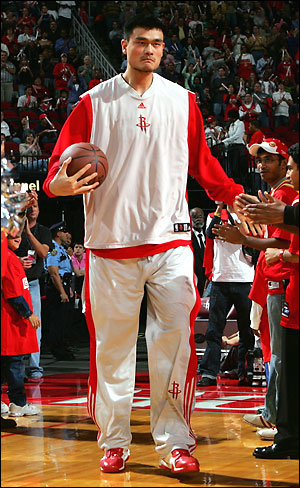 As a diehard hoops fan, I was extremely excited when Yao Ming first entered the NBA. Not only did it mark the emergence of a new and potentially great basketball talent, it also thrust an Asian male into the media spotlight and broke barriers in a sport that Asians have not traditionally been good at (yes, I know that Wang Zhizhi got there first, but his play wasn’t really something you could brag about). And I felt a thrill watching the first time Yao matched up against Shaq, which turned into pride as he more than held his own.
As a diehard hoops fan, I was extremely excited when Yao Ming first entered the NBA. Not only did it mark the emergence of a new and potentially great basketball talent, it also thrust an Asian male into the media spotlight and broke barriers in a sport that Asians have not traditionally been good at (yes, I know that Wang Zhizhi got there first, but his play wasn’t really something you could brag about). And I felt a thrill watching the first time Yao matched up against Shaq, which turned into pride as he more than held his own.
Yet ever since that game I’ve been disappointed by Yao. I don’t mean that Yao is a bad player – he puts up 20 points and 10 rebounds night after night and shoots a high percentage, both on the floor and on the foul line. He is an all star and one of the few good centers in the NBA. But he is not transcendent, and watching him play doesn’t inspire confidence that he will lead his team to a championship (it’s telling that Kobe Bryant and Lebron James both have more jersey sales than him in China).
There are all sorts of explanations for why Yao has not truly lived up to his potential, and some of them are valid: he has gotten unlucky with injuries. He is forced to play during the summer with the Chinese national team. His teammates have been ball hogs and not let him be the centerpiece of the offense. But the explanation that I think is the most interesting is that he isn’t aggressive enough. He passes too often. He doesn’t demand the ball when the game is on the line. He doesn’t dominate a game the way Shaq does. And what is interesting about this explanation is that it’s usually followed up with, he isn’t aggressive enough because he’s Chinese.
For example, the New York Times ran an article that asks why doesn’t Yao dunk. Their answer came down to cultural factors: “If you think of how community-oriented most young people growing up in China are, it’s just a different way of being brought up … There’s a lot more unity, and it seems like it’s a culture that promotes a more unselfish, ‘what’s best for everyone is what’s best for you’ mentality.”
I think there are a couple of interesting points here: First of all, where does the line between stereotyping and legitimate differences in cultural values get drawn? If I flipped this article on its head and said that black players dunk because their culture promotes physical aggression, I think a lot of people would be offended, but when the New York Times calls out Asians for being passive and lacking in individuality, this is okay?
But more important than asking whether this argument is politically correct is asking whether it is true. There’s something to the claim that Asian cultural values don’t emphasize aggression. While there are exceptions, most Asian people I know don’t rock the boat; they tend to be less loud and rambunctious than my non-Asian friends. And having grown up with Asian parents who never emphasized the idea of asserting one’s individuality, I can understand why.
In Yao Ming’s case, I believe that yes, he would be a better player if he were more aggressive, and that yes, at least some of that lack of aggressiveness comes from his cultural background. What is really interesting here is that this line of thinking implies a normative judgment – within the realm of professional basketball, I am saying that there are aspects of Chinese culture that are straight up bad (although I don’t see it quite such black and white terms; for example, Yao is also probably a better passer because of his cultural background). Moreover, I think this judgment potentially extends way beyond basketball. I feel like I’ve observed many situations where an Asian person’s passivity ends up working against them.
- Excited
- Fascinated
- Amused
- Disgusted
- Sad
- Angry








